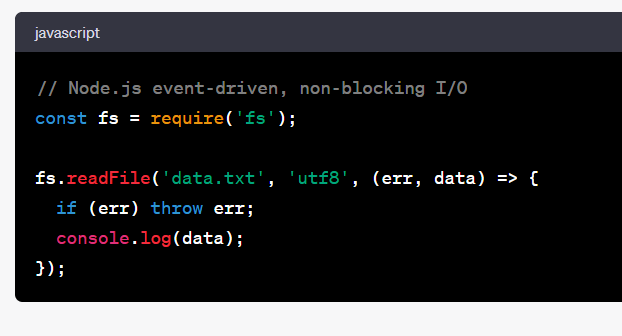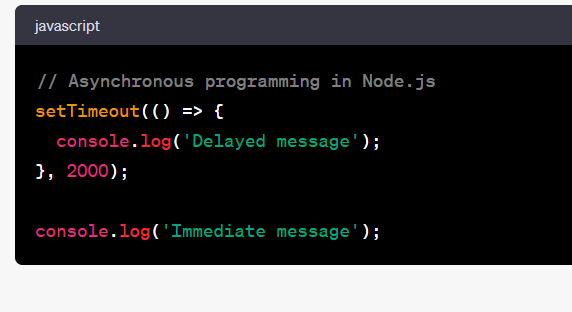What are the differences between Node.js and other frameworks?
 Darshana Mallick
Darshana MallickTable of contents

When it comes to server-side development, Node.js stands out as a unique and powerful framework. In this article, we will delve into the differences between Node.js and other frameworks, highlighting the key features and characteristics that set it apart.
By understanding these distinctions, developers can make informed decisions when choosing the right framework for their projects.
- JavaScript on the Server-Side: One of the major differentiators of Node.js is its use of JavaScript for server-side development. Unlike other frameworks that require developers to use different languages for client-side and server-side code, Node.js allows for a unified development experience. Developers can leverage their existing JavaScript skills and share code between the server and the browser, making development more efficient and seamless.
Example:

- Event-Driven and Non-Blocking I/O: Node.js follows an event-driven, non-blocking I/O model, which sets it apart from traditional server frameworks. Unlike frameworks that utilize threads to handle concurrent connections, Node.js uses a single-threaded event loop. This enables it to handle a large number of concurrent connections efficiently without blocking the execution of other tasks. As a result, Node.js can provide better scalability and responsiveness, particularly for applications with high I/O demands.
Example:

- Asynchronous Programming: Node.js heavily relies on asynchronous programming, allowing multiple operations to run concurrently. This approach is ideal for applications that require handling concurrent requests or performing time-consuming tasks, such as file operations or network requests. By avoiding blocking operations, Node.js maximizes resource utilization and improves overall performance.
Example:

- Vast Ecosystem and NPM: Node.js benefits from a rich ecosystem of libraries, modules, and tools. The Node Package Manager (NPM) is a central part of this ecosystem, providing easy access to a wide range of open-source packages. NPM enables developers to manage dependencies, share code, and leverage existing solutions, significantly speeding up the development process.
Example:

- Lightweight and Scalable: Node.js has a small memory footprint and is known for its lightweight nature. It utilizes a single-threaded architecture and event-driven model, making it efficient in handling concurrent connections. This scalability, combined with its non-blocking I/O, makes Node.js an excellent choice for building applications that require real-time communication or handling large numbers of concurrent users.
Conclusion:
Node.js distinguishes itself from other frameworks through its use of JavaScript for server-side development, event-driven and non-blocking I/O model, asynchronous programming approach, an extensive ecosystem with NPM, and its lightweight and scalable nature. Understanding these differences empowers developers to harness the unique features of Node.js and make informed decisions when selecting the right framework for their specific project requirements.
Subscribe to my newsletter
Read articles from Darshana Mallick directly inside your inbox. Subscribe to the newsletter, and don't miss out.
Written by

Darshana Mallick
Darshana Mallick
I am a Web Developer and SEO Specialist.